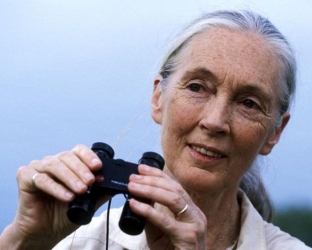  Jane Goodall is known for her years of living among chimpanzees in Tanzania; through her work with wild chimpanzees in Gombe Stream National Park she created one of the most definitive studies of primates in modern times.
Jane Goodall is known for her years of living among chimpanzees in Tanzania; through her work with wild chimpanzees in Gombe Stream National Park she created one of the most definitive studies of primates in modern times.Having met famed paleoanthropologist Dr. Louis Leakey, she was encouraged by him to embark on a study of chimpanzees. Her discoveries about primate behaviour , beginning in 1960, have continued to shape scientific discussion. A highly respected member of the world scientific community, she advocates for ecological preservation through the Jane Goodall Institute. The hope was that by studying our closest living relatives (chimpanzees share a common ancestor with humans) more could be discovered about what early humans were like. Despite the fact that the practice of naming one's study subjects was taboo in the science of animal behaviour, Jane managed to befriend an older chimpanzee whom she named 'David Greybeard'. As a high ranking male, his acceptance meant other group members also allowed Jane to observe them. It was David Greybeard whom Jane first witnessed using tools. She spotted the chimpanzee sticking blades of stiff grass into termite holes to extract termites. Excited, she telegraphed Dr. Leakey about her groundbreaking observation. He wrote back, “Now we must redefine ‘tool,’ redefine ‘man,’ or accept chimpanzees as humans.”  Goodall used her newfound acceptance by the chimpanzee family to establish what she termed the 'banana club', a daily feeding method she used to gain trust and to obtain a more thorough understanding of everyday chimpanzee behaviour. Goodall used her newfound acceptance by the chimpanzee family to establish what she termed the 'banana club', a daily feeding method she used to gain trust and to obtain a more thorough understanding of everyday chimpanzee behaviour. She was able to become closely acquainted with a majority of the reserve's chimps. She imitated their behaviours, spent time in the trees and ate their foods.  Goodall discovered a number of previously unknown chimpanzee behaviours. She described how they have a complex social system, complete with ritualized behaviours and primitive communication methods, including a 'language' system with more than 20 individual sounds. Goodall discovered a number of previously unknown chimpanzee behaviours. She described how they have a complex social system, complete with ritualized behaviours and primitive communication methods, including a 'language' system with more than 20 individual sounds. She is credited with making the first recorded observations of chimpanzees eating meat, and using and making tools. Toolmaking was previously thought to be an exclusively human trait. Goodall also discovred that chimpanzees throw stones as weapons, use touch and embraces to comfort one another, and develop long-term family bonds. The male plays no active role in family life, but the chimpanzee 'caste' system places the dominant males at the top. Jane Goodall's three major observations that challenged conventional ideas about chimpanzees:
 Beyond the significance of her discoveries, it was Jane’s high standard for methods and ethics in behavioural studies that may have had the greatest impact in the scientific community. Beyond the significance of her discoveries, it was Jane’s high standard for methods and ethics in behavioural studies that may have had the greatest impact in the scientific community.
Back at Cambridge University, she found herself at odds with senior scientists over the methods she used; in particular, how she had named the chimpanzees rather than using the more common numbering system, and for suggesting that chimps have emotions and personalities. She further upset those in power at the university when she wrote her first book, ‘My Friends, the Wild Chimpanzees", published by National Geographic, aimed at the general public rather than an academic audience. The book was wildly popular, although her academic peers were outraged. Dr. Jane Goodall earned her Ph.D. in 1966, and continued to work at Gombe for the next twenty years.  Jane has become a conservationist and activist, taking action to protect the rapidly disappearing forest to preserve the critical habitat of the chimpanzees. Jane has become a conservationist and activist, taking action to protect the rapidly disappearing forest to preserve the critical habitat of the chimpanzees. Jane is still at work today, raising awareness and money to protect chimpanzees, their habitats, and the planet we share. She travels about 300 days a year giving speeches, talking to government officials and business people around the world, encouraging them to support wildlife conservation and protect critical habitats. Jane helped set up several refuges for chimps. She established the Jane Goodall Institute in 1977, a global community-centered conservation organization, and JGI’s program Roots & Shoots in 1991, which encourages young people around the world to be agents of change by participating in projects that protect the environment, wildlife, or their communities. She has been an advocate for protecting animals, spreading peace, and living in harmony with the environment. Visit her website at janegoodall.ca. |